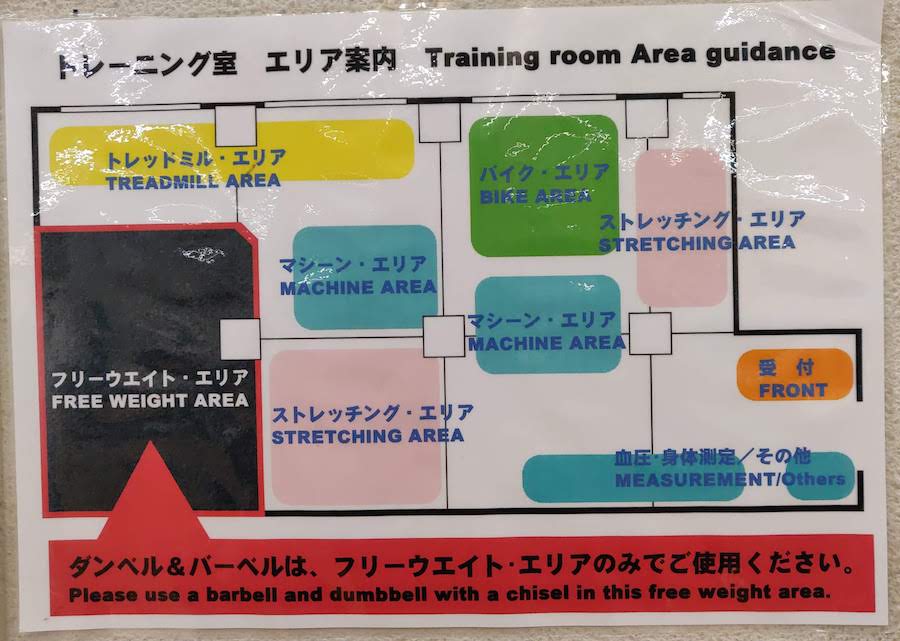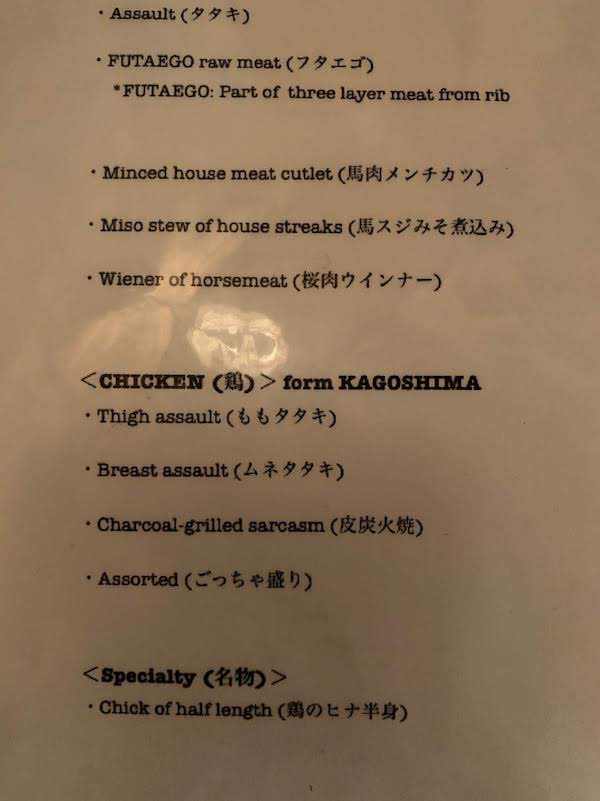Japlish and linguistic singularity hypotheses
« previous post | next post »
[This is a guest post by Nathan Hopson]
I wanted to share two photos with examples of Japlish. One appears to be the result of a quirky machine translation.
That's the "Training room area guidelines" from the municipal sports center near my home (the only gym I can afford on my salary). The offending passage is at the bottom:
"Please use a barbell and a dumbell with a chisel in this free weight area."
This novel use of a carving and gouging implement struck me as perhaps not so much a curious aspect of inscrutable Oriental culture as instead the hallmark of machine translation gone facepalmingly awry.
The original is:
ダンベル&バーベルは、フリー・ウエイト・
Danberu ando bāberu wa, furī weito eria nomi de goshiyō kudasai.
The "nomi de" is the culprit. In its intended meaning, it is just "only," as in "Please only use the dumbbells and barbells in the free weight area." However, the particle de is the instrumental, and nomi, depending on orthography, can be any number of marvelous things.
飲み・呑み → of or related to drinking, as in, say, a nomikai (飲み会), or drinking party
蚤・ノミ → flea, as in flea market, which was previously referred to as a nomi no ichi (蚤の市), but is now フリーマーケット (furī māketto) or, more commonly, フリマ (furima) — especially when referring to online flea market/auction sites.
のみ・ノミ → chisel
Yes, chisel has a kanji (鑿), but because it's quite complicated and neither included in the 2100 or so jōyō ("regular-use") kanji that are taught in the public school curriculum and used as the publishing standard for newspapers, for example, nor commonly part of the life experience of most Japanese — at least after completing middle school art — it's almost never used. In fact, it didn't even come up as an option in my input window.
The second photo is courtesy of a high school friend who visited Tokyo for the first time recently. She texted me this menu with a question about the chicken section. Yes, only one.
I was first struck (pardon the pun) by the many "assaults" on the menu. Japan is not known for the frequency of its violent crime, so this seemed a bit odd, particularly as an offering at a restaurant rather than an S&M club. As a culinary term, タタキ (from 叩く tataku, to beat) refers to one of two preparation techniques: 1) minced, 2) seared. I assume that in this case, it's most likely the latter, i.e., seared chicken, raw on the inside.
I wanted to just skip over the horse section altogether, especially since the horsemeat weiner jokes just write themselves and need no help from me whatsoever. However, it is worth noting two things here. First, "house streaks" should be "horse tendons" (馬スジ). "House" is a typo, "streaks" a mistranslation much like that of nomi above. I am told that in the world of omnivores and carnivores 筋 (suji) refers to Achilles tendon and/or other tendons and tendon-like meat byproducts. Beef suji are popular in stew; here, in a presumably upscale move, horse has been substituted. スジ also has numerous other meanings, abbreviated below from weblio.
すじ 筋
1
〈筋肉〉 a muscle
〈腱(けん)〉 a tendon; a sinew
2
〈線〉 《draw》 a line
〈条〉 a stripe; a streak.
3
〈血管〉 a vein
4
〈繊維〉 a fiber; a string
5
〈血統〉 blood; 【形式ばった表現】 lineage; 【形式ばった表現】 descent; 【形式ばった表現】 stock
6
〈素質〉 makings; nature; 【形式ばった表現】 an aptitude
7
〈条理〉 reason; logic
8
〈劇の〉 a plot; a story (line)
9
〈方面〉 quarters; a source; circles; a channel
Hardly difficult to choose the wrong one, given the one-in-nine odds if nothing else.
The one other notable thing about horse is that it is euphemistically referred to as 桜肉 (sakuraniku), "cherry (blossom) meat" for the sausage. I only find this odd inasmuch as the character for horse is used with no shame or pretense in the other two menu items.
BTW, boar (イノシシ) was referred to as 山鯨 (yamakujira,"mountain whale") during the Edo years in which meat eating was frowned upon.
Anyway, the crux of my friend's question was the "Charcoal-grilled sarcasm" in the offing.
Perhaps as a New Yorker she felt that she got enough burning sarcasm at home. Perhaps she was just curious or confused. In any case, it fell to me to explain that this was a sublime mistranslation of "charbroiled (chicken) skin."
皮炭火焼 (kawa sumibi yaki) = skin, charcoal grilled
I can only assume that someone entered this into a machine translation app as
皮肉炭火焼 (kawaniku sumibi yaki)
adding the character for meat (niku) in the hopes of achieving some sort of clarity. The best laid plans, &c.
The problem is that the Japanese term for sarcasm (and, ironically, irony) is 皮肉 (hiniku). If I understand correctly, the older meanings of both "skin and meat" (both literally and in the meaning of the corporeal body) and kawaniku ("skin-meat," i.e., just the very surface pickings) were largely supplanted in the first half of the nineteenth century by the meaning of irony. The connection, I assume, is that one goes in expecting meat and gets only skin. (Or perhaps rain on one's wedding day, or a free ride having already paid, etc.)
It is sometimes remarked that the failure to fully distinguish between irony and sarcasm is, along with a peculiar lack of overt and colorful vulgarity, one of the peculiarities of Japanese. I'm not taking a stance on this, though it is somewhat remarkable. Then again, liberty and freedom are also conflated as jiyū (自由), but English uses words like sanction to mean literally its own opposite, not to mention literally to mean literally its own opposite, so I'm trying to remain pretty agnostic about linguistic singularity hypotheses.


Noel Hunt said,
September 14, 2019 @ 7:15 pm
I don't believe there is anything unusual about フリー・ウエイト・エリアのみでご使用ください, furī weito eria nomi de goshiyō kudasai; 'nomi de' is merely a somewhat bookish synonym for 'dake de'. No Japanese would find this odd.
There are various theories as to why horse meat is called 'sakura' meat (sakura-niku), all to do with the colour of the meat at the time of sakura blooming, or because it is at that period that the meat is most tender and so on. Horse-meat hot pot (?) (nabe) is normally known as 'sakura nabe'. Wild boar 'nabe' is usually known as 牡丹鍋 'botan nabe', 'peony nabe', this because of the way the meat is thinly sliced and arranged on the plate to resemble a peony flower.
jhh said,
September 14, 2019 @ 7:31 pm
Personally, I've always preferred the term "Janglish" to "Japlish." It avoids any hint of the old slur "Jap," and instead, points to the jangling aural surprise of the new locution.
nekonominatto said,
September 15, 2019 @ 10:15 am
Couldn't 皮肉 be a calque of σαρκασμός = stripping off the flesh?
errg said,
September 15, 2019 @ 11:29 am
The other interesting about the gym guidance, is that most of the Japanese descriptions are using katakana for English derived words which are exactly the same in Japanese as in English, ie トレッドミル・エリア is simply (in Romaji) "toreddomiru・eria" which of course is how you'd write treadmill area in Japanese if you wanted to…
crilk said,
September 15, 2019 @ 8:36 pm
@jhh
I've always called it Engrish!
krogerfoot said,
September 16, 2019 @ 6:47 am
I didn't note anything in the OP about のみで nomi de being odd, and I don't think it's particularly bookish or exactly equivalent to だけで dake de. Dake indicates a limit with a sense of "not enough/not more," whereas nomi is more like "exclusively," with a similarly slightly elevated tone.
It would seem odd to me to substitute dake de for nomi de in the sign, as it would seem to say that the free weight area is the only area where, try as you might, the barbells will even work, while the original sentence means more properly that the barbells should be used exclusively in the free weight area, which is designated for that purpose.
What is odd is how the sign maker trusted the translation software over their own presumed six years' of English study to flub such a simple instruction. Although many Japanese people are vehement about their inability to communicate in English, in actual practice it's surprising that someone who was able to render フリーウェイト・エリアで naturally as "in this free weight area" would then fall down so spectacularly with the word "only." Considering that the sentence is composed almost entirely of English words, in face-to-face communication with a non-Japanese speaker most people would manage something like "Please use dumbbells and barbells only in free weight area."
Raempftl said,
September 16, 2019 @ 12:50 pm
„liberty and freedom are also conflated“
It seems that languages that make that distinction are the exception and not the rule. The Wikipedia article for „liberty“ has parallel articles in numerous languages. The one for „freedom“ has only two parallel articles.
Josh said,
September 17, 2019 @ 9:36 pm
"It seems that languages that make that distinction are the exception and not the rule. The Wikipedia article for „liberty" has parallel articles in numerous languages. The one for „freedom" has only two parallel articles."
Right. Rather than "liberty and freedom are also conflated [in Japanese]", I would put it, "English imported liberty from French while freedom already existed and has spent the last 700 years developing fine nuances in meaning and usage."
Yoshi said,
September 19, 2019 @ 6:35 am
I believe “hiniku” was a Buddhist term borrowed from a Chinese classic.
Also, a machine translation system may have learned or generated a translation based on erroneous morphological analysis, so you don’t have to assume that someone added the extra character “肉” (niku) on purpose.